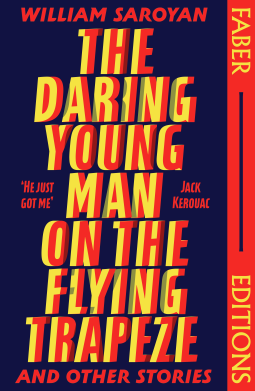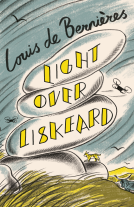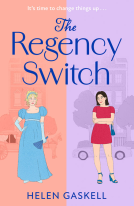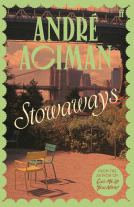
The Daring Young Man on the Flying Trapeze (Faber Editions)
by William Saroyan & Stephen Fry
This title was previously available on NetGalley and is now archived.
Send NetGalley books directly to your Kindle or Kindle app
1
To read on a Kindle or Kindle app, please add kindle@netgalley.com as an approved email address to receive files in your Amazon account. Click here for step-by-step instructions.
2
Also find your Kindle email address within your Amazon account, and enter it here.
Pub Date 7 Nov 2024 | Archive Date 21 Nov 2024
Faber and Faber Ltd | Faber Editions
Talking about this book? Use #TheDaringYoungManontheFlyingTrapezeFaberEditions #NetGalley. More hashtag tips!
Description
Originally published in 1934. A Lost Great American Master: meet Jack Kerouac's inspiration in these heart-expanding tales of immigrant life in 1930s USA, introduced by superfan Stephen Fry.
JACK KEROUAC: 'I loved him . . . He just got me'
ARTHUR MILLER: 'The first to let it all hang out and write like a child in wonderland.'
KURT VONNEGUT: 'Still the greatest.'
JOSEPH HELLER: 'My primary inspiration.'
STEPHEN FRY: 'One of the most underrated writers of the century.'
I hadn't had a haircut in forty days and forty nights, and I was beginning to look like several violinists out of work.
Depression-era San Francisco, home to the lost souls of many races: immigrants, struggling writers and heartsick adolescents, collecting in automats, nightschools, movies and barbershops, working in vineyards, telegram exchanges and as salesmen – and always revelling in being alive.
A bestseller on publication in 1934, The Daring Young Man on the Flying Trapeze was the debut collection by the Pulitzer Prize-winning (and rejecting) Armenian-American writer William Saroyan. Fusing Whitman's transcendence with the eccentric characterisation of Steinbeck and Salinger, and foreshadowing the rhapsodies of the Beats, his prose is a heart-expanding experience that intoxicates to this day.
Available Editions
| EDITION | Paperback |
| ISBN | 9780571383481 |
| PRICE | £9.99 (GBP) |
| PAGES | 232 |
Available on NetGalley
Average rating from 9 members
Featured Reviews
 Reviewer 1515085
Reviewer 1515085
This collection of short stories by William Saroyan, originally published in 1934, is being reissued by Faber Editions this autumn. It reminded me of Dziga Vertov's film 'Man with a Movie Camera' (1929) - a young man in the city trying to capture experiences of everyday life.
Many of the stories are written in first person. As Stephen Fry observes in the introduction to the new edition, while the narrative voice is a fictional construct, it is tempting to assume it is Saroyan himself. The tone is so personal and reflexive, as he confides that this is the first thing he has written since getting his typewriter back from the pawnbrokers, or notes wryly at the beginning of a story that writing beginnings is difficult. Much of the charm of the stories is in this directness and appearance of frankness.
In one story, the narrator is an impoverished young writer who is acerbic in his praise of successful authors, including Hemingway. He claims with not-quite-believable bravado, and an undertow of resentment, that he has "no desire to sell this story or any story to the Saturday Evening Post or to Cosmopolitan or to Harper's.... I am not expecting Paramount Pictures to film this work." It is self-mocking, humorous and perhaps slightly reckless for Saroyan to have written like this.
There is vivid intelligence and lightness of touch to the best of these tales, which are full of interesting tangents (for example: "we see the universe through the language we know... and we isolate ourselves in the language we know.") However, it's not a relaxing read, as there is a pervasive sense of anxiety underpinning these stories which were written during the Great Depression. Recurrent motifs include hunger, poverty, unemployment, the long shadow of World War I, the elusiveness of success, and death. Saroyan is often flippant and humorous about these topics, and some of the jokes still land 90 years later, though they are riddled with cultural references that are less familiar now (it took me a minute to realise that NRA stood for National Recovery Administration, not National Rifle Association). As with many books from that era, there is a smattering of outdated/offensive language and attitudes, though thankfully not much.
The note about the author, at the end of the collection, felt like a happily-ever-after: 'The Daring Young Man on the Flying Trapeze' became a bestseller in the 1930s, and Saroyan was later offered a Pulitzer Prize (which he turned down) and worked in Hollywood. Perhaps I am sentimental, but it is rather lovely that those pipedreams, that he claimed not to care about, came true.
Many thanks to the publisher and NetGalley for the advance copy.
 Alexandra S, Reviewer
Alexandra S, Reviewer
“If I have any desire at all, it is to show the brotherhood of man.”
I had heard of Saroyan, but in a vague way. So I was very pleased to see a new edition of his short stories on NetGalley.
The setting is the Great Depression. Saroyan is very male-centric in his stories – considering my “usual” reads, I thought it was almost refreshing. A change in perspective is one of the many reasons to love reading, I suppose. I did make sure to go through only a few stories a day, so that I wouldn’t overdose on young men.
Saroyan handles words with such dexterity! Everything is so simple, yet poetic. The writing is quietly explosive, warm, humane, whimsical, incredibly sad. The stories are all very short, they are fragments, vignettes. They are virtually plotless. Some of them are mesmerizing streams of consciousness. There are snapshots of tramps, beggars, prostitutes, flower peddlers, gamblers, struggling young writers. But ultimately, all the stories are about the miracle of being alive.
I don’t think it’s a good idea to review 26 stories, so let me just mention a few.
“The Daring Young Men on the Flying Trapeze” - a young man is starving to death. He is looking for work, but there is no work. “If the truth were known, he was half starved and yet still there was no end of books he ought to read before he died.”
“Seventy Thousand Assyrians” - an aspiring writer goes to get a haircut, watches people and thinks about many things. “I hadn’t had a haircut in forty days and forty nights, and I was beginning to look like several violinists out of work.”
“Love, Death, Sacrifice and so forth” – this one tells the plot of a Hollywood movie (probably a well-known one, unseen by me). It is satirical, funny and sad all at once. “All I know is this: that suicide is not an orderly occurrence with symphonic music.”
“A Curved Line” - a guy goes to an evening art class. Another mixture of whimsical and sad things. (The story is also rather “male-gazey”. Oh well). “The thing that worries me is that my great-grand-children are going to have to listen to “The Blue Danube Waltz” too.”
“A Cold Day” - a young author is freezing by his typewriter. “The man you write of need not perform some heroic or monstrous deed in order to make your prose great.”
Reading these gave me a feeling akin to happiness, despite so much heartbreak. As I looked up from the book after each story, everything and everyone grew sharper, more colourful, more here.
Thanks a lot to NetGalley and the publisher for the free e-book!
 Paromjit H, Reviewer
Paromjit H, Reviewer
This is my first acquaintance with the Armenian William Saroyan, his collection of 26 short stories, set primarily in California in the Great Depression, stories with a difference, written from the perspective of a young man, he makes no bones about there being nothing in the way of plot or the building of characters that other writers generally concentrate on. Stephen Fry's introduction tells us that he was urged to read the author by the actor Walter Matthau in the 1990s, even though Saroyan has been largely forgotten. This collection is not what he expected, we learn of a principled man who shunned commercialism, so much so he refuses a Pulitzer Prize, and the money that went with it.
Amidst the weary challenges of the Great Depression, Saroyan soaks himself in the atmosphere of the period, displaying a startling innocence and a lack of cynicism. There is poetic language, vibrant imagery, an empathetic tone, and rich descriptions, a wide ranging cast of characters, where there is a great sense of insights into life, humanity, and the celebration of human connections. We come across the experiences of bone deep poverty and starvation, men from a multitude of diverse backgrounds, writers, immigrants, those with ambitions, those who have nothing, gamblers. Saroyan focuses on the individuals rather than the economic system that failed people so catastrophically.
This is a darkly humorous, beautifully written collection by a author I am delighted to have become more familiar with. Saroyan should have a renewed light shone on his historical work, of its time, yet with themes that resonate and speak to us today, warmly elevating the ordinary into the extraordinary. Perhaps not every story worked for me, but this might be expected of most short story collections. I can certainly recommend this to a variety of readers who are likely to enjoy this collection by an author who deserves to be recognised and rediscovered. Many thanks to the publisher for an ARC.
 Michael J, Educator
Michael J, Educator
Reading this new publication of William Saroyan's first collection of short stories, it's almost impossible to believe that they were first published in 1934. They feel so vivid and modern (but not modernist), because they address themes and issues that still haunt us. The stories are short but very sharp in their exploration of immigrants' experiences (Saroyan's parents were Armenian and fled the Ottoman Empire), ordinary lives in California, and the politics of being a writer. Quite a few of stories are in factabout the business of writing and being a writer (e.g. 'Fight Your Own War'), which can only be a good thing. If the stories don't seem startling or hugely innovative now, it's probably because their influence on the Kerouacs of this world (and whatever you think of him, you can't deny Kerouac's own influence), which were so thoroughly absorbed. Saroyan also has a way with a telling phrase: "There is no truth. Only grammar, punctuation, and all that rot", he writes, for example, in the very wry "A Cold Day'. These are great and often astonishingly prescient stories and in this edition they are preceded by one of the best bits of name-dropping (by Stephen Fry) that I have read in a long time.
 Reviewer 494590
Reviewer 494590
Another 're-release from Faber Editions, first published in 1934. I have never heard of this author, but I find that they always pick interesting books for these editions so I was really pleased to be approved for an eARC.
I must admit that I am completely unfamiliar with the settings for these short stories, being set in the US during the depression, and when I read the first story, I wondered what I had let myself in for. I really enjoyed the second story however, so I was happy to carry on. The time can be quite depressing so I wouldn't read too many in one go, but it was great to dip into for something completely different to my usual fare.
*Many thanks to Netgally and Faber for a copy in exchange for an honest opinion*.
Readers who liked this book also liked:
Created by Hayao Miyazaki
Comics & Graphic Novels, Sci Fi & Fantasy


















